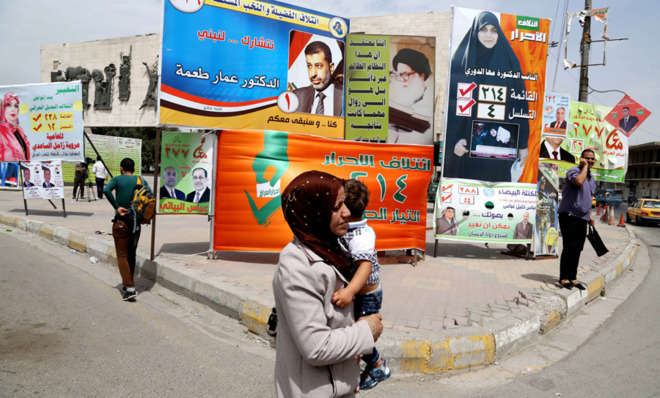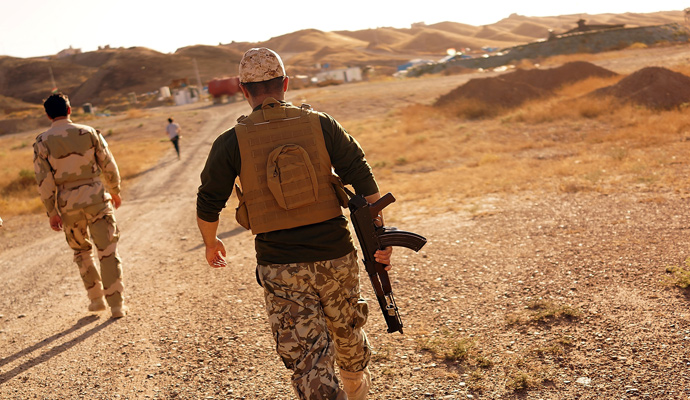Obama thought Baghdad played by Washington's rules. It doesn't.
This is a democracy made of straw

A free daily email with the biggest news stories of the day – and the best features from TheWeek.com
You are now subscribed
Your newsletter sign-up was successful

Vice President Joe Biden always had a clear idea of America's exit strategy in Iraq. President Barack Obama gave Biden the vexed Iraq portfolio in mid-2009, and when I flew with the vice president to Baghdad that summer, he explained to me that Iraq's sectarian leaders were, at the end of the day, politicians, like him, and faced the quandaries all politicians face. With an election looming the following year, Shiite Prime Minister Nouri al-Maliki had to hang on to his base while appealing to Sunnis and Kurds. "If he wants to stay in power," Biden asked, "how does he do it?" Sectarianism was a losing proposition in a multi-confessional state like Iraq. With a great deal of American help, Biden believed, Iraqis could learn how to use politics in order to settle disputes without bloodshed. Now that Iraq is teetering on the edge of civil war, or at the very least, state fragmentation, that faith looks very naïve indeed. It's fair to wonder if Biden was kidding himself, or me.
In The Dispensable Nation, Vali Nasr offers a harsh account of Obama's foreign policy. The scholar and former administration official argues that the White House was not committed either to promoting Iraqi national unity or to strengthening democratic institutions, but rather to "ensuring a state strong enough to permit U.S. withdrawal." The evidence is clear enough. The president's senior military officers had proposed that, after "active combat" operations ended in mid-2010, the United States would leave behind a residual force of at least 35,000 troops to help train Iraqi forces and suppress militias. The White House, eager to shift focus to Afghanistan and acutely aware of the public's disgust with America's unending role in Iraq, kept pushing that number down until it reached 3,500. When Iraqi leaders balked at the proposed terms of a status of forces agreement which would permit that force to remain, the administration decided to pull all troops out of the country. At this point, the White House had little choice but to claim that Iraq was prepared to stand on its own two feet. Iraqi politics became the administration's deus ex machina.
Until recently, events appeared to give substance to Biden's hope that politics could hold Iraq together despite the centrifugal pull of sectarianism. In a 2012 speech, Antony Blinken, then the vice president's national security advisor, said that the U.S. military effort had "created the time and space" for the advent of a new Iraqi political culture. In conversations over the years, Blinken, who later became the deputy national security advisor, often pointed out crises overcome without bloodshed. For example, in December, 2011, when Maliki sought to arrest Sunni Vice President Tariq al-Hashemi, on charges of terrorism, Sunni leaders did what politicians do — they cried bloody murder. They did not, however, commit murder.
The Week
Escape your echo chamber. Get the facts behind the news, plus analysis from multiple perspectives.

Sign up for The Week's Free Newsletters
From our morning news briefing to a weekly Good News Newsletter, get the best of The Week delivered directly to your inbox.
From our morning news briefing to a weekly Good News Newsletter, get the best of The Week delivered directly to your inbox.
(More from Foreign Policy: One billion drinkers can be wrong)
Earlier this week Blinken agreed to talk to me on the record about what went wrong. He pointed out, first, that the crisis Iraq is experiencing — invasion by Sunni extremists — is not the political collapse the administration's critics had long warned of. Even in recent months, he pointed out, "virtually all of the actors have continued to try to work within the political system, within the four corners of the constitution, albeit pushing those corners to the max." Instead of political failure producing civil war, the external security threat represented by the Islamic State of Iraq and al-Sham, or ISIS, had pushed the political system almost to collapse. Maliki, he said, could have reacted to the threat in such a way as to bring the parties together; he has plainly failed to do so, and now Iraq's Sunni minority appears to be throwing in its lot with extremists and their Baathist allies of convenience.
Well, maybe. But if you say that your house of straw stood up just fine until the big bad wolf gave an extra big puff, you have conceded that you built a rickety house. Biden's faith that the intrinsic logic of political competition would lead to compromise doesn't stand up to scrutiny much better than George W. Bush's faith that "free" Iraqis would build a democracy. Americans keep getting surprised that people in tormented countries don't behave according to the laws of material self-interest. The logic of sectarianism, or tribalism, keeps trumping the logic of the collective good.

The other problem with the Obama administration's view is that Iraq is not really suffering from an external threat. ISIS is rapidly recruiting Iraqis, and it has been joined by home-grown Sunni forces which have laid low in recent years. The astonishing rapidity with which this small band of fighters has conquered much of northern and western Iraq is a testimony to Maliki's failure to persuade Sunnis that they have a place in Iraq; neither Sunni citizens nor soldiers have been prepared to risk their lives to protect the Maliki regime. Maliki has been undermining Iraq's governing institutions since he was re-elected in late 2010. Now the time has come to pay the piper.
A free daily email with the biggest news stories of the day – and the best features from TheWeek.com
(More from Foreign Policy: Exclusive: Russia vetoes House of Cards)
Could the administration have prevented Maliki from returning to power, as Nasr and others claim? I doubt it. In The Endgame, an exhaustive history of the American entanglement with Iraq, authors Michael Gordon and Bernard Trainor recount the failed attempt to broke a multi-sectarian compromise; Biden could not even get the Kurds, America's true allies, to play along. Could the administration, alternatively, have bribed, threatened or persuaded Maliki to stop marginalizing and repressing Sunnis? Again, this seems fanciful. Maliki proved beyond much doubt that in contemporary Iraqi politics a rational actor can keep his grip on power while pursuing a ruthlessly sectarian agenda.
Can he still? Iraq held parliamentary elections on April 30. The Iraqi Supreme Court has now certified the election, beginning a process which will terminate with the election of a speaker, a president and a prime minister. Blinken says that the threat from ISIS just might prove to be the "catalyst" rather than the "circuit-breaker" for some kind of government of national unity. "There is a logic to all three communities dealing with the threat posed by [ISIS]," he observed. "But that logic can take hold only if a government comes into being that is committed to bringing the country together and not splitting it apart." The administration is working with Iraqi leaders to shape the process, as it did in 2010. That is not an altogether hopeful precedent.
Last time around, the hope was that Maliki would govern along with Ayad Allawi, the former prime minister whose Iraqiyya party had actually won more seats than Maliki's State of Law. This time, the White House is cajoling Shiite leaders to jettison Maliki in favor of a less divisive and authoritarian figure. According to reports from Baghdad, Shiite leaders have begun to consider doing just that. The administration has, however, agreed to send military advisors to the country without demanding political reform as a quid-pro-quo. Obama probably felt that, with the Visigoths already rattling the gates of the capital, he could not afford to wait for the political jockeying to play out over the coming months.
(More from Foreign Policy: Democracy, freedom, and apple pie aren't foreign policy)
Shiite militias and regular troops will almost certainly hold off the Sunni forces north of Baghdad, though the extremists may slip around the capital to besiege the holy Shiite cities to the south. The likeliest current scenario is a de facto Sunni-Shia partition, with the Kurds tightening their hold as well. Blinken concedes that it may be too late to preserve Iraq as a unitary state, but he points out that there's a world of difference between a "loose federation" and a perpetual civil war. An inclusive government which peels Sunnis away from the extremists will ultimately help facilitate the former; more sectarianism will virtually ensure the latter.
The Obama administration once hoped that the logic of politics would produce reconciliation in Iraq. Now it hopes that the logic of collective self-defense will do so. So far, it must be said, Iraq has operated according to a logic which Americans do not share, and perhaps cannot fathom.
-
 6 exquisite homes with vast acreage
6 exquisite homes with vast acreageFeature Featuring an off-the-grid contemporary home in New Mexico and lakefront farmhouse in Massachusetts
-
 Film reviews: ‘Wuthering Heights,’ ‘Good Luck, Have Fun, Don’t Die,’ and ‘Sirat’
Film reviews: ‘Wuthering Heights,’ ‘Good Luck, Have Fun, Don’t Die,’ and ‘Sirat’Feature An inconvenient love torments a would-be couple, a gonzo time traveler seeks to save humanity from AI, and a father’s desperate search goes deeply sideways
-
 Political cartoons for February 16
Political cartoons for February 16Cartoons Monday’s political cartoons include President's Day, a valentine from the Epstein files, and more
-
 The billionaires’ wealth tax: a catastrophe for California?
The billionaires’ wealth tax: a catastrophe for California?Talking Point Peter Thiel and Larry Page preparing to change state residency
-
 Bari Weiss’ ‘60 Minutes’ scandal is about more than one report
Bari Weiss’ ‘60 Minutes’ scandal is about more than one reportIN THE SPOTLIGHT By blocking an approved segment on a controversial prison holding US deportees in El Salvador, the editor-in-chief of CBS News has become the main story
-
 Has Zohran Mamdani shown the Democrats how to win again?
Has Zohran Mamdani shown the Democrats how to win again?Today’s Big Question New York City mayoral election touted as victory for left-wing populists but moderate centrist wins elsewhere present more complex path for Democratic Party
-
 Millions turn out for anti-Trump ‘No Kings’ rallies
Millions turn out for anti-Trump ‘No Kings’ ralliesSpeed Read An estimated 7 million people participated, 2 million more than at the first ‘No Kings’ protest in June
-
 Ghislaine Maxwell: angling for a Trump pardon
Ghislaine Maxwell: angling for a Trump pardonTalking Point Convicted sex trafficker's testimony could shed new light on president's links to Jeffrey Epstein
-
 The last words and final moments of 40 presidents
The last words and final moments of 40 presidentsThe Explainer Some are eloquent quotes worthy of the holders of the highest office in the nation, and others... aren't
-
 The JFK files: the truth at last?
The JFK files: the truth at last?In The Spotlight More than 64,000 previously classified documents relating the 1963 assassination of John F. Kennedy have been released by the Trump administration
-
 'Seriously, not literally': how should the world take Donald Trump?
'Seriously, not literally': how should the world take Donald Trump?Today's big question White House rhetoric and reality look likely to become increasingly blurred